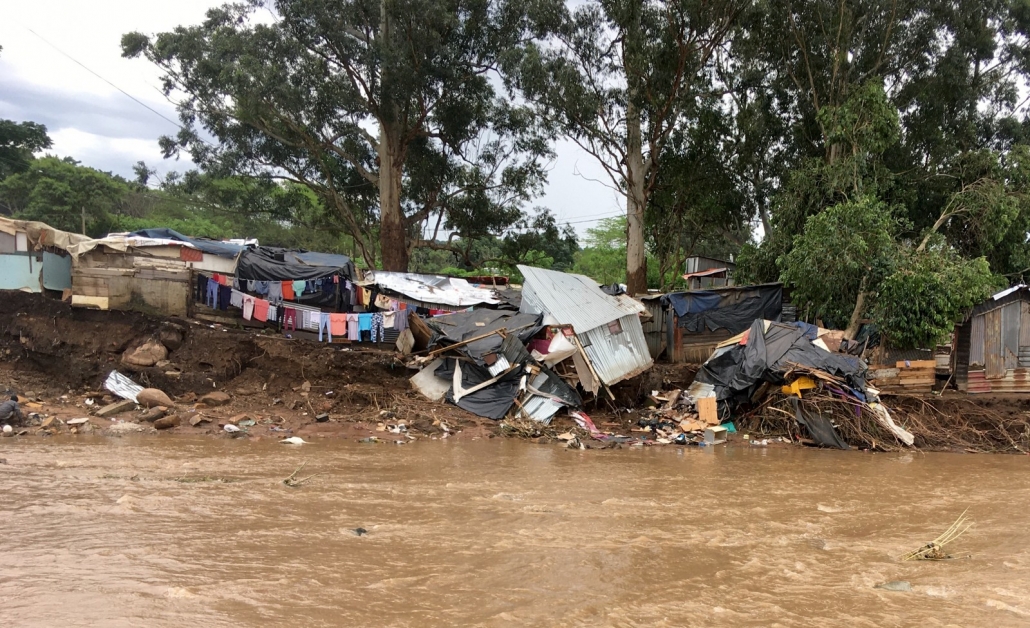The Stream, May 25, 2022: More Floods in Coastal South Africa Force Evacuations

The aftermath of last month’s floods in Durban, South Africa. Photo © Catherine Sutherland
YOUR GLOBAL RUNDOWN
- A recent report finds that more efficient water policies in California could cut water by at least 30 percent.
- Millions of people in Bangladesh and India have been impacted by recent flooding.
- Heavy rain is forcing hundreds to evacuate in coastal South Africa only a month after the worst flooding in history.
- A major scientific review finds evidence to support that some chemicals are contributing to global obesity.
Water shutoffs are becoming more and more common in Tijuana, Mexico.
“By the end of the month I have to decide, do I buy water or do I buy tortillas.”
– Maria Herrera, a resident in the outskirts of the Mexican city of Tijuana.
Unannounced water shutoffs are becoming more frequent and lasting longer in the Mexican city of Tijuana. Although Tijuana owns rights to any water from the Tijuana River, which flows across border lines, heavy pollution has long made the resource unusable. Now, the city relies solely on a single pipeline that carries water from the Colorado River.
In Recent Water News
Water’s True Cost: In Photos – The quality of Michigan’s water infrastructure and the consequences of failure, while still real and apparent, are no longer being ignored.
What’s Up With Water—May 24, 2022 — This week’s episode of What’s Up With Water covers heatwaves in India, dam removal across Europe, and a groundwater conservation proposal in Arizona.
HotSpots H2O: As Water Systems Fail in Pakistan, Heat Wave Begets A Health Crisis – Climate change and mismanagement sowed the seeds of a cholera outbreak.
New Report Unpacks California’s Potential for Water Conservation
A new report from the Pacific Institute found that more efficient water policies in California could cut the state’s usage nearly in half. Southern California would benefit most, the report found, from reducing water use indoors and outdoors, reusing treated wastewater and collecting more rain runoff. Overall, the study concluded that a variety of existing technologies and practices could reduce urban water use in the state by between 30 and 48 percent.
- Why It Matters: Last summer, Circle of Blue, along with Pacific Institute, Vector Center, and APCO Worldwide, hosted a special convening of experts, journalists, and other leaders in the American West to discuss the megadrought in the American West and its implications for the future of water. Watch the full webinar, and catch up on the latest drought coverage from Circle of Blue.
This Week’s Top Water Stories, Told In Numbers
2 MILLION PEOPLE
Heavy rain has caused intense flooding in parts of Bangladesh and India. At least 57 deaths have been reported. In Bangladesh, around two million people have been stranded by the deluge, and a million more have been impacted. The region is prone to flooding, and experts say climate change is increasing the likelihood of extreme weather events.
- Women and Climate Change: As families in rural Bangladesh increasingly spend more and more on climate adaptation, women are bearing the brunt. A study from the International Institute for Environment and Development found that in households headed by women, up to 30 percent of the woman’s spending goes towards climate resilience.
250 PEOPLE
In South Africa’s coastal KwaZulu-Natal province, hundreds of people have been evacuated due to the most recent bout of heavy rain. Around 250 people had been evacuated from care centers in Tongaat and Durban so far. The region is still recovering from a deadly deluge last month that left more than 400 people dead and thousands homeless.
On the Radar
A recent scientific review found that chemical pollution, including many found in drinking water, are contributing to global obesity. More than 40 scientists contributed to three review papers that studied the impact of toxins known as “obesogens,” which are not yet recognized in mainstream medicine. More than a dozen people involved in the study say that mounting evidence proves the toxins should be taken more seriously. The research found that, among other impacts, obesogens can change the body’s genetic makeup – and some of those genes can be passed onto children.
More Water News
New research found that drinking water supplies in Lagos, Nigeria are widely contaminated with microplastics.
A water treatment plant in Shoal Lake #40, a First Nation community in Ontario, is being recognized by the province for providing opportunities for local procurement and employment. Until the plant opened last September, the community had been under a boil-water advisory for nearly a quarter-century.
Jane is a Communications Associate for Circle of Blue. She writes The Stream and has covered domestic and international water issues for Circle of Blue. She is a recent graduate of Grand Valley State University, where she studied Multimedia Journalism and Women, Gender and Sexuality Studies. During her time at Grand Valley, she was the host of the Community Service Learning Center podcast Be the Change. Currently based in Grand Rapids, Michigan, Jane enjoys listening to music, reading and spending time outdoors.







Leave a Reply
Want to join the discussion?Feel free to contribute!